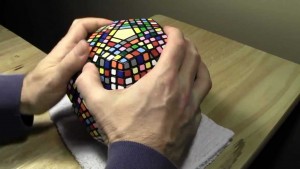Since this site is about puzzles, I figured it a suitable blog post to answer the question “What is a puzzle?”
Probably with similar debates to the age old question of is it a sport or a game – what exactly deviates a puzzle from a game?
Commonly puzzles test the following skills:
- Ingenuity – Figure out how to solve the puzzle
- Speed – How fast can you figure out the puzzle
- Knowledge – If it’s not a mechanical puzzle you can “figure out” per se – do you have the knowledge to solve it?
- Problem solving – A puzzle is merely a problem that must be solved
What is a puzzle?
One thing we can decide for sure is that a puzzle has a definite ending. A jigsaw puzzle is complete when it’s fully assembled, the Rubik’s cube is solved when all of the sides are solid colors, a disentanglement puzzle is solved when it’s, well, disentangled.
A puzzle, depending on its difficulty, makes you think. You need to figure out how you’ll solve it and this involves variable usage of the brain.
Long time puzzle collector Stan Isaac’s has a quote definition of a puzzle that states:
- A puzzle is fun
- and it has a right answer
While I don’t necessarily agree with the first statement, as there are plenty of puzzles that are not necessarily fun to everyone, I do agree with the second.
Types of puzzles

There are several different types of puzzles, let’s go over some of the common ones to help identify their characteristics and therefore define puzzles.
- Logic puzzles – Riddles etc.
- Math based puzzles – Find the missing number in the series
- Mechanical puzzles – Rubik’s, disentanglement, rope puzzles
- Pen and paper – Mazes
- Word puzzles – Crosswords, hangman
- Number puzzles – Sudoku, other similar style puzzles
Phases of puzzling
Maybe it’s the same, or maybe different for you, but I go through a few phases when solving puzzles.
- Observation – Observe the puzzle, maybe physically if it’s mechanical
- Testing – Test my observed solution
- Iterate – If the above is not successful, repeat
So what makes up a puzzle then
The pieces of a puzzle are as follows, based on the previous evidence we can extrapolate:
- A puzzle has a definite ending – it can have more than one ending depending on the solution – it has a clear GOAL
- A puzzle tests the solver on some level on ingenuity, knowledge, and other skills relative to the puzzle
- There are different types of puzzles
- Some level of logical reasoning is needed to solve a puzzle – this depends on the difficulty
Another definition from The Random House dictionary answers the question “What is a puzzle” as “a toy or other contrivance designed to amuse, presenting difficulties to be solved by ingenuity or patient effort.” I guess this definition places a puzzle as one physical/mental entity and does not include non-enjoyable or non-toys as puzzles, which is the difference for me. I think that a puzzle is any problem that has a solution – whether or not the solution can be found or not is an entirely different story. I think in one of my next pieces I’ll write on whether or not the solution to some puzzles exists, or should exist.
Until next time, happy puzzling!
Leave a Reply